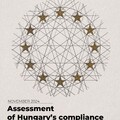On 18 October 2022 the Hungarian government submitted a bill to amend the Freedom of Information Act. The amendment is part of legislation done in order to fulfill proposed remedial measures under the financial conditionality mechanism and aims to shorten FOI lawsuits and amend rules on proactive data disclosure.
Among the bills tabled under an urgency procedure, the Freedom of Information Act has already been amended once. The amendment adopted two weeks ago dissolved the possibility for public bodies to charge data requesters a fee on the grounds of disproportionate workload the data request might cause. As from January, special laws invoking emergency (‘state of danger’) will no longer provide the option for public bodies to delay a response for up to three months.
The currently proposed amendment concerns both the court procedures in FOI cases and the duty of public bodies to disclose data proactively. This blogpost summarizes the key changes and K-Monitor’s recommendations.
The post has been updated pursuant to a recent amendment of the Bill. See the closing remarks of the post.
Main elements of the amendment:
-
Shortened deadlines would apply both for the court and the parties
-
First hearing of the case: evidence on the spot
-
Cases cannot be stayed or suspended, even if the parties wish so
-
Proactive data disclosure would become fragmented
-
The repository of data on public contracts would not be comprehensive and would not include contracts, only their metadata

K-Monitor’s recommendations for a Hungarian FOI reform
General recommendation
Findings of the National Authority for Data Protection and Freedom of Information (the NAIH) research of 2022 co-funded by the EU on FOI should be considered when drafting new bills to reform Hungarian FOI law.
Recommendations on Qualification of Data
The practice of data holders to qualify information as data crucial for a decision-making process (‘döntés megalapozását szolgáló adat’) should be monitored by the NAIH and should be revised based on the NAIH’s findings.
The possibility to exclude access to information relating to future decision-making (after the decision the data was meant to support has been made) should be removed from the FOI Act, as this provision became an encouragement for data holders to withhold documents of public interest for a decade without substantial justification.
Current provisions making rejections broadly permissible under copyright and trade or banking secrets should be restricted.
Recommendations on Legal Remedies and Sanctions
K-Monitor welcomes the attempt formulated in Bill T/1616 to speed up FOI lawsuits.
The Bill fails to address that public bodies might change the justification for rejection before and after the lawsuit is filed, which makes the position of data requester more vulnerable before court. Therefore, data holders should be bound before court by the reasoning provided when rejecting a FOI request.
The FOI Act should prescribe mandatory sanctions to deter data holders from failing to disclose information prescribed in the proactive publication scheme attached to the FOI Act;
The FOI Act should prescribe sanctions for data holders that fail to reply to the data requester or comply with their duty to annually submit statistics on their FOI practice to the NAIH. The NAIH should monitor data holders with a below the average response rate and formulate recommendations to improve their response practices.
Deadlines shall be set for the NAIH to process FOI related inquiries initiated by data requesters.
Mandatory representation by an attorney before the court in FOI lawsuits against public bodies at national level should be abolished as it disproportionately restricts requesters' access to justice.
Provisions of the Criminal Code regarding FOI Misuse of data of public interest ('közérdekű adattal visszaélés') should be revised as the prevailing law is ineffective to deter public bodies from FOI violations.
Recommendations on Proactive disclosures
The planned Central Public Data Information Register shall not substitute proactive data disclosure on the website of public authorities.
The planned Central Public Data Information Register shall publish contracts and meta data of contracts of all entities performing a public duty as such entities have an existing obligation to proactively disclose information of public interest. The current wording of Bill T/1616 would narrow down the scope of disclosure. Scope of the proactive disclosure should be extended to corporate entities owned by the state or municipalities.
Corporate entities concluding contracts with public bodies should fall under a stricter scrutiny of NAIH regarding their information obligations on the ground of paragraph 27 (3a) of Act CXII of 2011.
Besides meta data on contracts (as currently proposed in Bill T/1616) the planned Central Public Data Information Register shall also publish full contracts in a machine readable format. This would significantly reduce the number of data requests. Such portals have been operating in the Czech Republic and Slovakia for a long time.
Beneficial ownership information of private bodies contracted by entities performing a public duty or becoming beneficiaries of public funds shall be published along with names of entities contracted by bodies subject to the FOI Act.
Besides data on contracts, the long overdue 'Transparency portal' funded by the EU shall publish spending data of public institutions (similarly to the Slovenian Erar website, or the website of the municipality of Budapest).
Recent amendments and bills under discussion intend to improve access to public information, an issue raised in several EU reports (Country Chapter on the rule of law situation in Hungary - 2022, Country Report Hungary of 2020, 2019, Recommendation for the Council on the 2019 National Reform Programme of Hungary and delivering a Council opinion on the 2019 Convergence Programme of Hungary).
In more details: FOI litigation
According to Bill 1616 FOI lawsuits will be heard according to rules known from libel cases against the press.
1) Shortened Deadlines
Freedom of information cases have always been heard out of turn, but the law did not set specific deadlines for the court. It was therefore not unlawful for the court to hear FOI cases under the general rules.
Within 30 days of receiving the application, the court examined whether the action was admissible. If it found it admissible, it sent the action to the defendant to draft the defence within 45 days. The court then had the option to order further written submissions and call upon the plaintiff to respond to the defendant’s arguments. Only then could a first hearing be scheduled. In practice, this meant that up to 3 months could elapse between the filing of the application and the first hearing of the case.
According to the bill, the court will have to hold a hearing within 15 days of receiving the action. Within this two-week period, the defendant does not necessarily have to respond in writing to the plaintiff's claim, but only at the first hearing, orally. The fact that the hearing can only be postponed in exceptional cases also serves to speed up the procedure.
Both the court of first instance and the court of appeal have 15 days to formulate in a written form and send the judgment to the parties instead of 30 days upon promulgation.
However, the parties still have 15 days to file an appeal. The court of appeal must decide within 15 days upon receipt of the file. If a party has requested a hearing, this means that a hearing must also be held within 15 days. The Kúria, which is the highest court of Hungary assigned to deal with extraordinary appeals, will also have to hurry in the future: it will have to deal with cases within 60 days of receipt of the file at the latest.
2) Evidence On the Spot
It is proposed that the preliminary hearing of the case should be followed by the trial immediately. However, compared to the general rules of civil procedure, only evidence that is already available at the trial or that is immediately proposed by the parties present can be used as evidence in the court procedure. Even if the trial is adjourned, no new evidence may be adduced later. Therefore everyone should attend the first hearing prepared to provide proof for all potentially disputed questions.
3) Forced Schedule
The bill excludes a number of possibilities that could slow down the procedure. If someone misses a deadline, they cannot excuse themselves later. Neither the plaintiff nor the defendant can rely on a legal argument that has not yet been raised among the first arguments. If the parties wish to negotiate out of court, they can no longer request a stay of proceedings. The court cannot suspend the proceedings either.
Assessment
Public Bodies’ Practice Won’t Change
The goal to speed up the procedure is welcomed and the amendment has the potential to significantly shorten the time required to bring actions for access to data, thus providing citizens with information more quickly.
However, K-Monitor believes that it is not only the speed of court cases that has been a barrier to freedom of information but also the often negative or slow and incomplete responses of public bodies, which have ultimately led to litigation. This has been particularly true in the last two years, when the government has allowed public bodies to delay responses for up to 3 months on the grounds of an emergency law (‘state of danger’).
The option for public bodies to extend the time limit of responding to a request up to 30 days remains unchanged. In practice, this opens the possibility for a decision not to disclose the data to be taken as late as the 30th day.
A Less Risky Way Is Still Not an Effective Remedy
If a citizen does not accept the response of a data holder, there are two remedies available. Citizens can either turn to the National Authority for Data Protection and Freedom of Information (NAIH) or to a court. While the Authority's procedure is free of charge and there is no obligation to hire a lawyer, a judicial remedy is much riskier. Firstly, in most court cases, the plaintiff must hire a lawyer, otherwise the court will not hear the case. Secondly, if the data requester loses the case, the court will oblige the data requester to pay the state body's legal costs. The NAIH procedure can therefore be more accessible for the data requester, however, it cannot be considered an efficient remedy, since its decision is not binding.
However, the bill does not change this, so by contrast with a court, the NAIH cannot compel the bodies to release the data. Another problem is that there is no strict deadline for the NAIH to act, as the time taken by public bodies to respond NAIH’s enquiry does not count towards the authority's procedural deadline. The bill does not address these two issues.
The bill likewise does not change the rule in force since 2018, according to which it has been mandatory to have a lawyer in all court cases concerning bodies with competences at national level. For example, ministries, main government agencies can only be sued with a lawyer. Although it is possible to request a lawyer from the state, legal aid services do not work properly in Hungary, so only those who have enough money to hire a lawyer within 30 days can act in time.
New Rules of Giving Evidence May Be More Disadvantageous for Citizens
Even if the case goes to court as planned, the plaintiffs may find themselves in a difficult position at the first hearing, where they are called to prove their case straight away, even if they do not know the defense’s arguments.
Such inconveniences can easily occur. A lawsuit must be filed within 30 days even if the state body has simply left the data request unanswered. In such cases, citizens must sue the state body without knowing the reason for the denial. The same could also be the case if the defendant had provided a completely different justification for refusal to the one presented at the hearing. The new rules still do not exclude this possibility.
Under the new rules, the state body can choose to present its defense only at the first hearing. In such a case, the plaintiff would first have to face the grounds for refusal and would have to figure out on the spot how and with what evidence to challenge the defense.
The burden of proof in FOI cases is partly shifted: the burden of proof is on the citizen to prove that the data exist, are in the public interest and are held by the state body sued. The defendant must prove that the refusal was justified. Since the state body has had at least 15 days to assess the data request and to think about its justification, an obligation to give evidence promptly during the preliminary hearing is more onerous for the citizen, even if the first hearing will require a more thorough preparation on the side of the defendant as well. This is less of an issue at libel cases this legal concept is built on.
Deal not to Be Done
There are two possible negative consequences of not being able to request a pause in the procedure even if both parties would need it. On the one hand, the leeway for circumventing the very short deadlines by a joint request for a pause in order to develop more thorough motions is limited. On the other hand, the parties are unlikely to reach a settlement if they have virtually no time or opportunity to negotiate with each other outside the hearing. It is not clear why a joint request for a stay should be excluded, since a possible settlement would provide a more efficient tool to access public information than a time consuming court procedure, at the end of which the court's decision would have to be enforced in an additional procedure.
Constitutional Court: Too Late and Too Slow
Since the bill excludes the possibility of the court suspending the case precludes the possibility of the court referring the legislation to be applied to the Constitutional Court if it finds that it violates the Fundamental Law. If, for example, the court considers that the recently issued government decree classifying Government's documents is unconstitutional, it cannot refer the matter to the Constitutional Court. The law in question will have to be applied, even if unconstitutional and only the parties and only after a final judgment being served can request a review of the constitutionality of the law.
Although the rules for litigation have been speeded up, there is no time limit for the Constitutional Court's proceedings. For example, the Constitutional Court may not even have ruled on complaints relating to FOI that were refused several years ago.
Hungary is Still in Breach of an International Treaty
Although the Council of Eurpes’s Tromsø Convention on Access to Documents entered into force in December 2020, the Hungarian government has done nothing to implement the Convention. Under the Convention, if the public authority does not hold the requested official document or if it is not authorized to process that request, it shall, wherever possible, refer the application or the applicant to the competent public authority. Despite the entry into force of the Convention, there is no such obligation of Hungarian authorities. Moreover, even if the body insists in court that it does not have the data, it is still not obliged to tell the court which other body is competent.
In more details: Proactive Disclosures
The other set of amendments concerns data that authorities are required to publish proactively.
Until now, the Freedom of Information Act has generally obliged public bodies to publish the data listed in the annex to the Act, primarily on their own websites, or, in the case of bodies below the national level, at their choice, on the central website operated by the government.
According to the bill, government bodies and municipalities could opt out from publishing data on contracts on their websites, once publishing them on a new site, the so-called Central Public Data Information Register. The published data must be made publicly available for 5 years.
Firstly, the new site has a more limited scope than the previous one (kozadat.hu). For example, state-owned companies performing public duties, schools, museums and hospitals do not fall under the scope of the Central Public Data Information Register. Secondly, having the possibility to opt out from publication on their own website without the need to refer to the central repository will ultimately fragment the disclosures, and citizens will have to spend more time to find and understand open data.
Assessment
The bill does nothing to change the shortcomings that have already hollowed out the proactive disclosure provisions. Nor does it create a single national register for contracts, which would be a substantive improvement. It is easy to see why this is not in the government's interest, since a scheme requiring mandatory publication would allow to list all contracts public bodies concluded with a given companey, e.g. a company of a government-close business man.
Contracts Still Not to Be Published
The bill essentially requires the publication of the same data that the Freedom of Information Act already requires bodies to publish: meta data on contracts and subsidies. However, the contracts and agreements themselves will therefore continue to have to be requested on a case-by-case basis, and the necessity to go to court in case of denial will remain.
Under the current wording of the bill, authorities opting for the new online register may not publish the details of contracts worth up to HUF 5 million at all.
Fragmented Transparency
Transparency will be reduced by the fact that authorities will soon have the right to opt out from publishing certain data on their websites. Government bodies obliged to publish data on contracts in the central repository may choose not to publish the same information on their website, creating an inchoherent disclosure scheme. Although even the State Audit Office of Hungary found that the government's centrally maintained site can not fulfill its function, it is not clear how the new government site would be an improvement. The NAIH has pointed out that until the government has not issued the decree governing the site in detail, no assessment can be made on the bill.
No Sanctions, No Consequences
The bill does not change the fact that there are no consequences for failure to disclose public information. The NAIH neither has the competence nor the capacity in staff to monitor the disclosure of thousands of public bodies and to sanction them in case of failure to do so.
Readable and Searchable Data: Courtesy of the Public Bodies
Although a core element of FOI is easy access to data, there is still no requirement to disclose published data in machine-searchable formats. Thus, in the future, public bodies may continue to disclose information in a way that is not machine searchable at all or difficult to process. A good example of the former is the allocation rule of court cases determining which judge hears different cases. Another example for a hardly legible disclosure are MP' assets declarations: citizens still have to rely on handwritten, scanned scribbles to find out that their representative has declared all the assets they are required by law to declare.
1 Bn. HUF for A Research in Hungarian Freedom of Information
With the contribution of EU funding, the NAIH carried out the research project ‘Mapping domestic freedom of information practices and improving their effectiveness.’ The 1 billion HUF project will be completed by the end of this year. Despite the fact that the above presented amendments are, according to the government, in agreement with the European Commission, neither the explanatory memorandum of the bills nor the new provisions indicate that the government has taken the findings of this research into account. Without doing so, a year of work by experts would likely go wasted as it is hard to imagine that after reaching an agreement with the EU the government would initiate another reform of the FOI Act.
Update
Recent changes pursuant to an amendment submitted to the Bill on Friday 4 November 2022:
- it is still possible for the defendants to present their defence only at the hearing, so this might be the first time when the data requesters become aware of the reasons why their FOI request was denied
- even though there is a leeway for changing the arguments in the application or the defence, it still holds that only evidence that is already available on the first day of the hearing (or at least that the plaintiff was already able to indicate can be used as evidence during the whole trial
- ordinary courts will maintain the right to refer a law to the Constitutional Court or the Court of Justice of the European Union if they find that a FOI law violates the Fundamental Law of Hungary or EU law
- it is still not possible to stay the procedure at the request of the parties
- the recent amendment allows not only the NAIH but also companies alleging trade secrets to intervene in a lawsuit, which could strengthen the litigation position of public bodies
- the new rules on litigation shall only apply to FOI requests submitted after 31 December 2022
- the Central Public Data Information Register. shall ensure that meta-data are (1) machine-readable, (2) groupable, (3) aggregated, (4) searchable, (5) extractable and (6) comparable
- the Central Public Data Information Register. shall keep published data available for 10 years instead of the planned 5 years
- the Central Public Data Information Register should also indicate the proportion of national and EU resources used and the identification of public procurement contracts according to the Electronic Public Procurement System ('EKR-azonosító')
(This post has been edited: In a fist version of this blog post we refered to the publication of contract data in the central repository as optional. However, only the publication of contract data on the data holders own website becomes optional for those obliged to use the central repository)
K-Monitor is a non-profit public funds watchdog based in Budapest, Hungary. It was founded to improve the levels of transparency, accountability and the rule of law in Hungary. Civic participation and technology driven solutions are among the organizations key instruments.
Címkék: english EU conditionality
Szólj hozzá!
A bejegyzés trackback címe:
Kommentek:
A hozzászólások a vonatkozó jogszabályok értelmében felhasználói tartalomnak minősülnek, értük a szolgáltatás technikai üzemeltetője semmilyen felelősséget nem vállal, azokat nem ellenőrzi. Kifogás esetén forduljon a blog szerkesztőjéhez. Részletek a Felhasználási feltételekben és az adatvédelmi tájékoztatóban.





